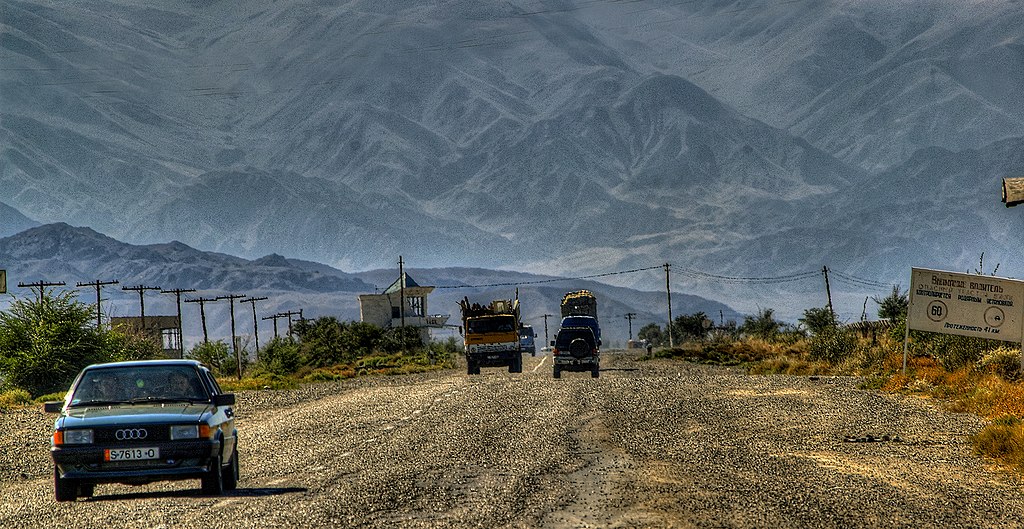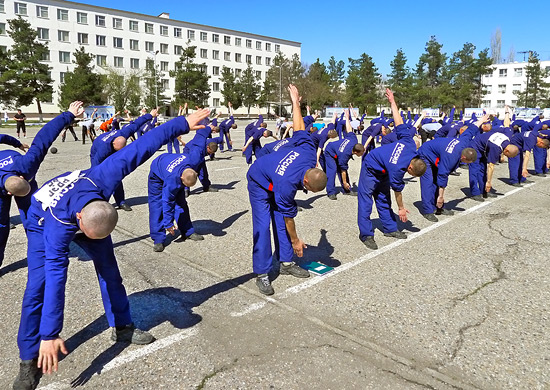
Kyrgyz Highway A363 towards Chinese border-Xinjiang.
“China firmly supports Uzbekistan in safeguarding its national sovereignty, independence, and territorial integrity, and firmly supports Uzbekistan in choosing its own development path.”
China seeks to strengthen its security cooperation with Central Asian countries to safeguard its core interests in the Belt and Road Initiative (BRI). According to the first excerpted article from the official newspaper of the Chinese Communist Party, People’s Daily, Chinese President Xi Jinping met his Uzbek counterpart, President Shavkat Mirziyoyev, in Beijing and pledged an “all-weather comprehensive strategic partnership” with Uzbekistan. This places Uzbekistan at the highest ranking of China’s foreign relations alongside Pakistan, Belarus, and Venezuela. These elevated diplomatic ties not only pave the way for the advancement of strategic BRI projects but also signal to the BRI stakeholders the urgency of security cooperation in the current turbulent international environment.
To this end, Mirziyoyev places significant emphasis on the One-China principle and strictly opposes external interference in China’s internal affairs, especially with regard to Beijing’s crackdown on Uyghurs in Xinjiang Province in the name of deradicalization. Xinjiang is home to the Muslim Uyghur minority and borders the former Soviet states of Central Asia, serving as the geopolitical linchpin in the success of the rejuvenation of the Silk Road. Mirziyoyev firmly supports China stabilizing Xinjiang by taking repressive measures to eradicate extremism, terrorism, and separatism. This state visit indicates a growing China-Central Asia alliance in security cooperation and soft power development. The day before Mirziyoyev’s visit, China’s State Council Information Office released a whitepaper, cited in the second excerpted article. This white paper articulates the legal basis for countering “The Three Evils,”[i] operation and supervision mechanisms, and China’s vision of security cooperation on a regional and global scale.[ii] With the growing “all-weather comprehensive strategic partnership” in the region, Beijing is undertaking a more direct engagement in Central Asia’s security and defense capabilities. Overall, China’s multifaceted BRI strategies are likely to intensify the growing Great Power competition in the region.
Sources:
Yijun Yang, “习近平同乌兹别克斯坦总统米尔济约耶夫会谈 (Xi Jinping holds talks with President Mirziyoyev of Uzbekistan),” People’s Daily (official newspaper of the Chinese Communist Party Central Committee), 25 January 2024. http://paper.people.com.cn/rmrb/html/2024-01/25/nw.D110000renmrb_20240125_1-01.htm
On January 24, President Xi Jinping hosted President Mirziyoyev of Uzbekistan at the Great Hall of the People. The two heads of state announced that China and Uzbekistan have decided to develop an all-weather comprehensive strategic partnership, symbolizing an era of a more meaningful and dynamic China-Uzbekistan relationship.
Facing the current complex international situation, the two sides pledged to build a solid foundation for mutual trust and continue with high-quality joint construction of the Belt and Road Initiative (BRI). China firmly supports Uzbekistan in safeguarding its national sovereignty, independence, and territorial integrity, and firmly supports Uzbekistan in choosing its own development path.
Mirziyoyev said that he looks forward to the opportunity to further consolidate and deepen mutual trust and expand all-round cooperation under the BRI, including agriculture, green energy, and tourism. Uzbekistan firmly abides by the One-China principle, resolutely opposes external forces interfering in China’s internal affairs, and is willing to firmly support China on issues involving Taiwan, Xinjiang, human rights, and other matters related to China’s core interests. Furthermore, Uzbekistan is ready to work with China to combat the “Three Evilsand safeguard their respective and regional security.
“中国的反恐怖主义法律制度体系与实践 (China’s Legal Framework and Measures for Counterterrorism),” The State Council Information Office of the People’s Republic of China, 23 January 2024. http://english.scio.gov.cn/whitepapers/2024-01/23/content_116958678.htm
Terrorism poses a persistent and asymmetric threat to international peace and security. China has found a path of law-based counterterrorism that conforms to its realities by establishing a sound legal framework, promoting strict, impartial, procedure-based law enforcement, and ensuring impartial administration of justice and effective protection of human rights…
Relying on more than 40 years of experience, China has gradually developed a counterterrorism legal framework based on the Constitution. The Counterterrorism Law, in concert with the criminal laws and National Security Law, covers administrative regulations, judicial interpretations, local regulations, and departmental and local government rules…Upholding the vision of a global community of shared future, China is willing to work closely with other countries to push forward counterterrorism cause as part of global governance. On the basis of equality and respect, China will engage in extensive exchanges, cooperation, and mutual learning to facilitate the global effort to counter terrorism.
Notes:
[i] The “Three Evils” (三股恶势力) is a political slogan referencing extremism, terrorism, and separatism.
[ii] Released by China’s State Council Information Office, the white paper consists of chapters such as “An Improving Legal Framework for Counterterrorism,” “Clear Provisions for the Determination and Punishment of Terrorist Activities,” “Standardized Exercise of Power in Fighting Terrorism,” “Protection of Human Rights in Counterterrorism Practices,” and “Effective Protection of People’s Safety and National Security.”
Image Information:
Image: Kyrgyz Highway A363 towards Chinese border-Xinjiang.
Source: https://commons.wikimedia.org/wiki/File:Kyrgyzstan_(6052094329).jpg
Attribution: CC BY 2.0


